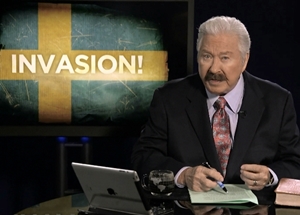 Israel longs for peace. I’ve been there dozens of times and spent quality time with political leaders, such as Benjamin Netanyahu, and with legendary military leaders. I’ve spoken at length with regular soldiers and regular people, Jews and Palestinians. I can tell you with certainty that Israel desperately longs for peace, probably more than any other nation in the world. Look at how many times they have been willing to compromise their safety for so-called “peace agreements” where the “peace” ended up being only a mirage in the desert.
Israel longs for peace. I’ve been there dozens of times and spent quality time with political leaders, such as Benjamin Netanyahu, and with legendary military leaders. I’ve spoken at length with regular soldiers and regular people, Jews and Palestinians. I can tell you with certainty that Israel desperately longs for peace, probably more than any other nation in the world. Look at how many times they have been willing to compromise their safety for so-called “peace agreements” where the “peace” ended up being only a mirage in the desert.
But when someone comes in and murders over 1,300 of your citizens and injures over 3,000 more, what do you do? Hamas took 150 Israelis as hostages. They fired on unarmed young people at a music festival as though it were a shooting gallery. They launched thousands of missiles into civilian areas, even hitting and mostly destroying a children’s hospital. Hamas gunmen invaded Israeli neighborhoods, murdering whole families in their homes — families eating breakfasts or who were still in bed at 6:30 on a Saturday morning. The terrorists set houses ablaze. They killed scores of babies and toddlers. They beheaded babies! How should Israel respond? No matter how much it wants peace, how would any nation respond?
Standing beside the Qatari Prime Minister, US Secretary of State Blinken said it well. “No country can tolerate having a terrorist group come in and slaughter its people…. What Israel is doing is not retaliation. What Israel is doing is defending the lives of its people and, as I said, trying to make sure this cannot happen again. And I think any country faced with what Israel has suffered would likely do the same thing. Imagine if this had happened in the United States.”
Much of the world’s media sees this as simply another step in the Israeli-Palestinian “cycle of violence.” One side does something bad to the other and the other side reacts with something even worse. Then the first side reacts in a still stronger way. The violence grows more extreme, deepening the hatred that fuels it. Feeding on itself, this process leads to greater violence and mounting rage. And the cycle continues… or so they say.
But that is not an accurate depiction of the cycle of violence at work in the Holy Land. Hamas grew out of Arab and Persian hatred for Israel. Hatred of Israel began as hatred for Jews. Hatred against Jews is a tenet of faith and an outgrowth of religious zeal. That makes it unappeasable.
The real cycle of violence between Israel and Hamas works like this. Hamas attacks, and Israel reciprocates by stopping Hamas’s immediate ability to attack. Under pressure from allies, Israel does only enough to temporarily declaw Hamas. Each conflict intensifies Gazan poverty, and after each one, the world’s nations send aid. But because Hamas controls Gaza, Hamas controls the aid. Hamas gives away enough to make regular Gazans see them as a source of help. But mostly, Hamas leaders make themselves rich and rebuild their war machine. Other nations, such as Iran, hate Israel as much as Hamas does, and they give direct military aid.
When strong enough, Hamas attacks again. And again, Israel stops them — still doing only enough to stop their immediate ability to make war. Nations again help. Hamas again rebuilds. And when it is strong enough, Hamas attacks again. That is the cycle of violence Israel faces.
Prime Minister Netanyahu has said that it will be different this time. He believes the atrocities and war crimes of recent attacks will give his military an opportunity to bring a complete end to Hamas rule in Gaza. But even if he can depose Hamas, the nature of this conflict means that a similar group will arise. Hatred against Israel is not about land, rights, or money. It is a tenet of faith.
Israel’s struggle for survival will not end until Israel’s Messiah returns.
Transmitted by Hal Lindsey October 15, 2023



